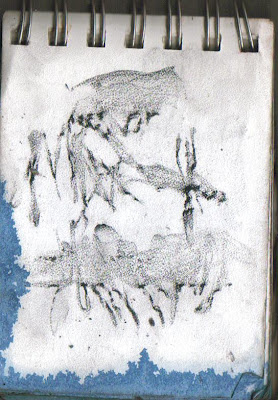Saturday, July 25, 2009
Wednesday, July 15, 2009
Tuesday, July 14, 2009
Sunday, July 12, 2009
Wednesday, July 8, 2009
Sunday, July 5, 2009
Chirot poesies Chonores pour Chopin

for Bob COBBING-
who is the first Person-Poet-Artist-Perfromer (and so far the last person sadly-!) who talked about Chopin with me
and then a day later i told Bob that Henri Chopin had appeared in a dream i had the night before,
riding down an escalator wearing a very long scarf thrown back over his shoulders
dressed very like Doug Kershaw on the cover of the Spanish Moss LP--very much a presence who broadcast as his eyes looked out and over the people the escalator the plants and--
his face had a fierce sense of pride in it, of knowing himself-
with a broad sweeping gesture he took the errant scarf and flung it again around his neck and over his shoulder--
like hieratic male Diva!
and then he smiled--
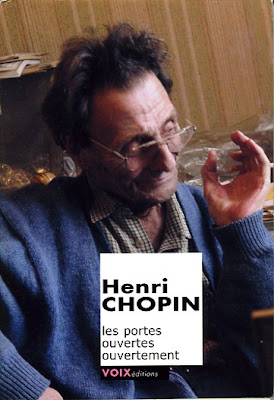
"Get rid of all those bits of paper, whole, torn, folded, or not. It is man's body that is poetry, and the streets."
--Henri Chopin, 1969
A paradox in making this little book, petit bouquin, (MOUTH/BOUCHE poesie chonore pour Chopin--) these "bits of paper" "for Henri Chopin," i "crossed the line" of his injunction.
The only way i could think to find a way between "no bits of paper" and "the body, the streets," here is to use direct hand prints with rubBEings, spray paintings off of objects/letterings found in the streets.
They are made "quick'n'dirty" to enact the movements of sound and body of Henri Chopin--in one's head or a disc or a video-at once physical and "highly strung" in the sensation emerging, being emitted form from & by the nervous system . . .
So, these pieces are made from an intact smaller tire from a truck, with still the inner sections for the axle on it, a metal piece with numbers and a company logo, which had fallen off of a telephone pole i a big storm. Almost ever telephone pole in Milwaukee has these; they are very flexible and are most often just casually nailed to the poles. I also used lettering fro a "Prison Radio," which is made of clear plastic to supposedly cut down on the contraband entering the Correctional System. It is like a radio version of those old transparent human figures--"The Visible Woman/Man"--so that children may become familiar with their entrails and other True Marvels. here one may observe and study the entrails of a minimal, cheap but--the point of it all-- functioning radio.
I found the radio thrown with other unwanted and/or "useless" electronic equipment at the base of a big blue dumpster t the back of a row of houses, in a wide alley
pleasantly planted with perennials and small cacti plants
The radio then ,this transparent BEing-may be carrying the ghost sounds of plants who also are fascinated by the great works of Henri Chopin.
The Ghosthumous Writings here, then, of both myself and the plants, or of the day in the alley --of the light and air--these are Ghosthumous messages from the street via the body--the hand (Chiro means "hand" in ancient Greek).
The "released' Prison Radio plays--and no, one thinks of Jack Spicer's radio nor that of Jean Marais, playing the eponymously title of the Cocteau film Orphee.
No!! not at all! No! because one thinks and hears touches sees moves, acts-- the liberation which Henri Chopin brought to poetry, to dispense with texts the way that Artaud dispensed with God's Judgment--and so perhaps what i should do after posting this note is to set fire to these pages and be like one of Artaud's "victims signaling through the flames."
And continues broadcasting the phantom songs of Henri Chopin, the sound itself being a BEing which moves through the air and down the streets, the alleys--
and is --here--there--everywhere--
"Chonore" is neolgism of Ch(irot) Cho(pin)(son)ore. It also could be "Chopallinaire"
to get "Calligramatically carried away--so to come wil be a piece inthis mode among many another to be sure, when one is haunted by the voice and movements of henri Chopin--
notre ami qui ne s'arrette jamais son (sonor) et mouvent--
uNE BOUCHE QUI SE BOUGE!





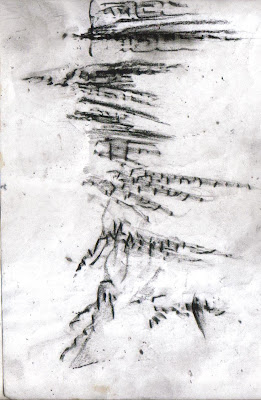




Friday, July 3, 2009
onto || logical
s . he . de
cided to
(sided) to
be
come an a . the . ist
so go . d
would like
her be . tt . er
cided to
(sided) to
be
come an a . the . ist
so go . d
would like
her be . tt . er
Thursday, July 2, 2009
G-L-Vidiamodopo: Poetry Mag's Flarf Issue & the Issue of Flarf--Deleuzian Masochism, Rassentiment & CommoDEIfied High Kultur Approval Ratings






Meet me when the wolf bane blooms--meet me when the blood runs cold--meet me in St Louis and sing me a plagiarized song --using a copy made in human excrement --from the only existing original-- hidden deep deep in the bankers Wall Street vault where Bartleby the Scrivener died in the Tombs--
preferring not to-
be like this--
Ridiculing in Reagan style--
the ripped off losers--
wandering aimless in the streets
while you, you , bitterly angered, fitfully bored-
alive to the sounds of the cash drawers chiming
or at least fat hands with big rings applauding-
filled with the swag of coffers and drinking
with scoffers what a wonder you are
O American poet
USA Number One!
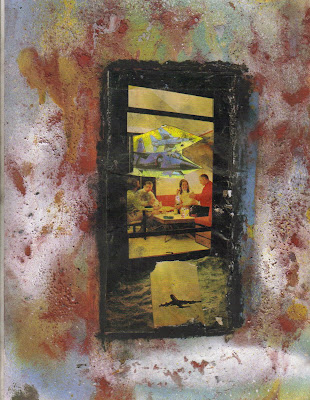





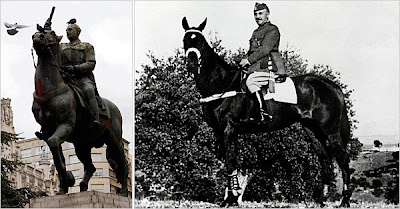
Kitsch of old Dictators haunts the corridors of Flarf events with Corportae Commodeified Conceptualists in tandem, among the great chandeliered halls of Bankers' Balls . . .
Kitsch of Nationalist imagery, Zenophobic putdowns, snide pseudo-shock-your-parents poems, bellowed over the DOJ loudspeakers and megaphones . . .
Beneath the "fun" surfaces flows torture, chemical warfare, genocide, ethnic cleansings, prions populations the greatest on earth--
Kitsch of old Fascist Kultur blooming among the fertile fields of academia, corporate sponsored conventions, beneath the moon of staged landings and faked discoveries--or perhaps real--who can tell anymore and why should they care--
Beneath the moon where hang the ripe corpses--
Bad Poetry, Garbage Poetry is Turned to Gold, Goodness,and Virtue, Because No Good American Poet Can Write Bad Verse!
O! take them seriously!
For after all they are torturing bombing burning stealing murdering building Apartheid Walls and in their sleep dreaming dreaming of the Splendours of Empire, of being an Imperialist American poet--
thank god!
and not having to write poems about the dreary boring world, the dull jobs, the lack of insurance but instead bask in the heart warming glow of the electric fire and sing odes to the Sponsors . . . Corporate Giants, corrupt political parties and Lobbyists--
Copies, plagiarisms, prevail and no one can tell anyone apart anymore because they're al clones--drones--

Lunar Landing Conspiracy Kitsch: Moon Landing in a Film Studio--Moon Landing "on the Moon"--
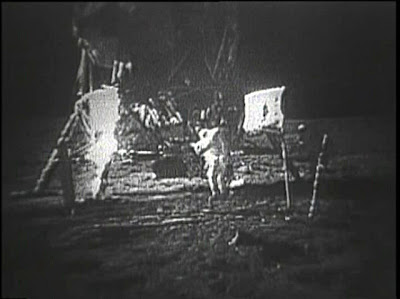

Unidentified Flarfalien Object
From the Dictionary of Accepted Ideas by Gustave Flaubert:
Chiaroscuro: No one knows what this means.

"For fun only, and in memory of "Vasco Fiasco," the Immortal Carl Solomon's name for Allen Ginsberg when CS felt and knew that AG had abandoned the True Dada,
I shall call this little talk "Fiesta-Fiasco" in cheerful good spirits and honor to that Great Mentor, Carl Solomon, and always, to preserve and live by his Spiritual Teachings—among which it is paramount--to laugh at ourselves--!"-
-Il Professore G-L Vidiamodopo
I asked my friend, whom I now introduce to you with a drum roll—I asked my dear friend Il Professore G-L Vidiamodopo, whose learned discourse on the Grand Piano first published here may also be found archived at—(forgive the showing off of the Credentials of this Giant who needs verily no such thing except when it is necessary to be “rubber stamped” as “someone taken seriously despite all”—for the sake of those who require driver’s Licenses and “references” & etc-)
(Barrett Watten): there is now as complete a list as possible of reviews and comments
on the project at: http://www.english.wayne.edu/fac%5Fpages/ewatten/posts/post34.html#linksas well as an archive-in-process at our website: http://www.thegrandpiano.org
& also:
"Taking the Grand Piano Literally"
September 8, 2007
Blog: Silliman's Blog
Link: http://ronsilliman.blogspot.com/2007/09/history-of-lighght-taking-grand-piano.html
--
Yes, I asked my dear friend--
To see if he might offer some insights regarding today’s themes, soups de jour, chart topping hits--—which he has generously agreed to do, in his well-known manner, and after of course having performed a small ritual dedication and thanks to Il Fondatore, Il Maestro di Parole in Liberace . . .

Has agreed to do so—
If first there is presented a little bit of background—
With which here & now –that is to say, “below,”--
Is begun this presentation/examination/investigation/divagation:
Poetry Magazine, once long ago an avant-garde journal and for decades now a good solid dust collector and soporific, has of late been "reaching out" to find objects, isms, schools to examine and present in issues which function as both mini-anthologies of the ISM in question, as well as Introductory Courses in said ISM for those completely unfamiliar with any practices of Poetry outside the realm of Poetry's versions of it.
Coupled with the journal's provocative Harriett blog, and funded by one of the most massive bequests ever given to a literary enterprise in the USA, Poetry can be said to be inserting itself slowly but surely into territories usually jealously guarded by the elites who alone claim to "own and understand them."

As usually is the case, the various elites and "marginal" poets being represented are at once deeply flattered and deeply wary, some even a bit embarrassed by their finding themselves swept up into the CV glory these days of a Poetry appearance.
Of course, there are always those poets who try to have the best of both worlds--criticizing the issue that they themselves at the last minute only deigned to contribute to. These are usually the poets trying to play it safe, gambling on betting on both sides so whoever wins they can say they have supported them.
That way they can always claim to be and tell their grandchildren that they were, on the "side of History," a "groundbreaking agent of change," when in fact they were most concerned about maintaining their safe stance under the thin veneer of an outdated "experimentalism"

Following a recent Issue which contained an Introductory Gallery as it were of Visual Poetry, in the latest Issue Poetry has turned its gaze towards Flarf and Conceptualism, the very darling (and let us not forget the ubiquitous “daring”) movements generated by highly educated—and, for many of the poets, teaching at the “higher education” level-- elites which in order to thumb their noses at their own class, (i.e. “pour epater la bourgeoisie,” to shock the bourgeoisie), revel in the aestheticized and commoDEIFIED boredom of an aestheticized Corporate Conceptualism and in the anti-PC, deliberately “bad poetry” (now being seen as “good poetry”) generated by random Google searches which has spawned “Flarf.”
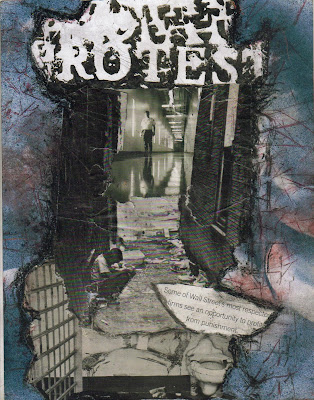
While Corporate Conceptualism, excuse me, Conceptualism—celebrates boredom, copying, unoriginality and a host of other “non-nessess,” Flarf celebrates the products of boredom itself, generated from Google searches by aco-corporate poets suffering from what Baudelaire called “Acedie, la maladie des moines.” (Acedia, malady of monks.)

As my august friend Il Professore Vidiamodopo puts it so succinctly:
“is it not the poetry of the bored scions of the rich parents or culture who, feeling impotent within the structures of power in which they find themselves, despite al these riches, forced to toil, and so, debt –ridden, filled with rassentiment, revolting by the creating of “revolting—to their parents ‘ eyes, supposedly anyway--literally and figurative—works?
Is this not related in its own fashion to that description of masochism given by Gilles Deleuze as “a father is being beaten,” with here the father being al that a Father can stand for, while the scions are after all all that the father—to their minds-- won’t stand for, yet bankrolls nonetheless as being something which can be “turned to advantage” if “promoted correctly.” And so in the end –no matter what the “course of development” has developed into--yield a profit not only for the prophet Father but for the scions also, now elevated to an elite status far above that of the poets of the status quo and given swank evenings at al the best venues, galleries, opening nights and “monkey suit” gatherings of the art/high society set.”

Wanting to find out more about the Flarf “issue” and the Flarf Issue of Poetry, a press of the Google search key so beloved by Flarfists and Flarfistas, led to the blog of flarfista Sharon Mesmer, “Virgin Formica” at which I found the following two entries which I submitted to a commentary, again, by my friend, Il Professore, as a way to better understand how it is that flarf, like Conceptualism, is the “key” to the Elite Status “mingling and even surpassing’ those poems already out there on the golf courses and in the locker rooms of the squash clubs usually found in the pages of Poetry and which Language Poets such as Charles Bernstein and Rae Armantrout, among many others, have found in returning to their True Homes, the very Official Verse Culture sites they have long ranted against, such as Harpers, the New Yorker, and who knows, perhaps soon enough the truly “arrived” pages of TV Guide, Readers Digest, People Magazine, Self, the New Republic etc.
(“Fortunately,” Il Professore laughs, “they will never be accepted by my favorite literary publications such as Weekly World News, the Enquirer, and the zines put out by local ruffians.”)

Il Professore asks that it be noted that the Virgin Formica blog was found via a random Google search and not singled out in any way—as indeed neither Il Professore nor I, as we are ashamed& embarrassed to admit, had ever known of it before.
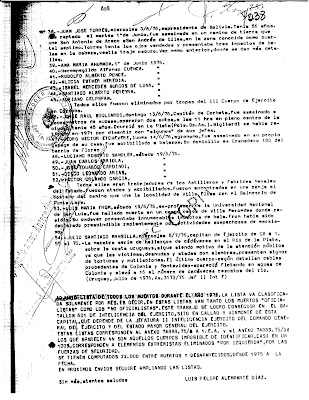
Our apologies to all concerned then, for “as I am sure,” as Il Professore says,” that our very naïveté and ignorance will provide both many a contemptuous cat call and snide laugh from those august poets and poetasters who dedicate themselves to the High Seriousness posing as Low Comedy which the elitist elites of Flarfism conceive of as a critique of their very own class and education as they educate it, And so, therefore, are bound by al the rules of the game to laugh and look down at hoodlums such as ourselves, crashing the party and being such punk assholes as to dare to critique the mighty movement of the Los Flarfistos des Falangistes in the ongoing quest of American poetry to become as Accepted and Popular as TV.
“And, at the same time, certo, as Highly Elevated to the Status-Afflatus-Apparatus of High Art set atop High Structures—which the works of Jeff Koons have made the envy of al other Flarfist-oriented though not necessarily named so “cultural workers,” toiling in the verdant fields of “quale di dollare in piu.”

“And that is why, dear persons—I so often refer to Flarf, an uncommon name as yet, by the much more well known rubric of “Marshmallow Flarf,” which in itself combines the desire for mass popularity attained by Marshmallow Fluff and our own sense of humor . . . a meta-critique buried inside a bad joke perhaps, but is this not what los Flarfos are essaying to do themselves----dans la maniere d’apres –Koons, ou, comme on dit en americain—post-Koonsian Poetics---which after al is related to Post Keynsian Economics—and Post Cartoonsian Pop Art—aka—Post Kitsch oder Post Kitch mit Kirsch--
From Virgin Formica:
Tuesday, June 23, 2009
Flarf Is In POETRY (And So Am I)
Flarf is in Poetry, and I’m in flarf, so I’m in Poetry too. Oh, Harriet Monroe. Oh, Ruth Lilly, whose family’s liquid vitamin B — Homicibrin, or some such name — I took as a child for underweightedness. I can still taste it.
In this, the July/August issue, with a summery watermelon smiley on the cover, flarf falls under the same watermelon smiley as Philip Levine, Tony Hoagland and Jane Hirschfield, whose poem (“Perishable, It Said”) ends with the line . . .
inside that hour with its perishing perfumes and clashings.
The following is from the journal Poets & Writers, in an essay/review by Shell Fischer which constitutes Virgin Formica’s blog entry of
Monday, June 22, 2009
Can Flarf Ever Be Taken Seriously?
by Shell Fischer
News and Trends
July/August 2009
“Almost a decade after its creation, the experimental poetry movement Flarf—is showing signs of having cleared a spot among the ranks of legitimate art forms . . . many in the literary world are taking the poems seriously . . .
“(The) group latched onto a technique poet Drew Gardner had been using to construct his own work: searching the Internet for random terms and crafting the results into poems. . .
“(In Flarf ) . . . poets prowl the Internet using random word searches, e-mail the bizarre results to one another, then distill the newly found phrases into poems that are often as disturbing as they are hilarious . . .
“But then a funny thing happened: Their poems evolved from "bad" to "sort of great," Gardner says . . .

“So far, at least sixteen books of Flarf have been published—a flurry of them just in the past several years. Since 2006, the Bowery Poetry Club in Manhattan has held an annual three-day Flarf Festival that features poetry as well as "flarf" music, theater, and film. Last September a group of Flarf poets were invited to read at the Walker Art Center in Minneapolis. In April, New York City's Whitney Museum of American Art hosted its own Flarf reading. And in November, Washington, D.C.–based independent publisher Edge Books will release a four-hundred-page anthology, Flarf: An Anthology of Flarf, featuring the work of twenty-five to thirty poets”

Monday, June 22, 2009
Can Flarf Ever Be Taken Seriously?
by Shell Fischer
News and Trends
July/August 2009
Quoted from this article are the following:
Poet Sharon Mesmer describes the process this way: "There's this idea that juxtaposition creates a little pop in your mind to take you out of your immediate, mundane reality. When we do these crazy things with Google, a lot of times we're putting something beautiful together with something ugly, and it makes this third thing that is completely delightful and unexpected."
(“Dialectics of Google,” as Il Professore calls it, “the three step way to the “synthesis.”)
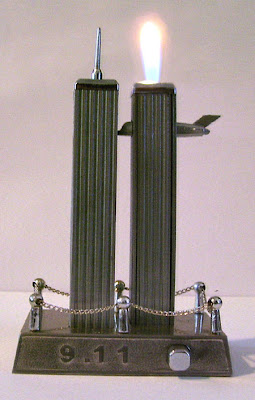
Edge Books publisher Rod Smith, a poet himself, says he feels the collective is prompting a bit of anarchy in the poetry world by widening the vocabulary of what is permissible. "Aesthetic judgments about what's bad in a very hierarchal society are usually serving upper-class people with a certain amount of privilege," he says. "So for a bunch of poets who are very well schooled in a variety of traditions of American poetry to take what's considered bad and throw that at people is a very interesting maneuver. It's not simply bad poetry; it's quote-unquote bad poetry written by people who know how to write poetry.

"Aesthetic judgments about what's bad in a very hierarchal society are usually serving upper-class people with a certain amount of privilege”—
“Is this not the elite of the Flarfists themselves and whom they are addressing, in the hopes of full scale promotion, PR of the highest level, big money funding, gallery spaces, the provision of High Culture Sites etc to Flarfize in—“—Il Professore laughs and looks out over the industrial wastelands . . . where squatters read the skies for signs of hope—or study intently the night stars for astrological messages . . .
"So for a bunch of poets who are very well schooled in a variety of traditions of American poetry to take what's considered bad and throw that at people is a very interesting maneuver,” as Rod Smith goes on to observe; contrast this with the reception by the same elite, educated crowd of poets of the “bad poems by bad people badly translated” by the Guantanamo Poets.

In other words, it is an interesting maneuver if done by Americans, but if, in their eyes, done by “bad people” from “bad countries and cultures’ of course it is “bad poetry” because it is far more dangerous to their class, country and culture than the “bad poetry” which began to morph into good poetry by good people “who” in Rod Smith’s words “know how to write poetry.”
Continued from Virgin Formica: Tuesday, June 23, 2009
Flarf Is In POETRY (And So Am I)
“For comparison, here’s Philip Levine’s poem, “An Extraordinary Morning” . . .
Two young men — you might call them boys —
waiting for the Woodward streetcar to get
them downtown. Yes, they’re tired, they’re also
dirty, and happy. Happy because they’ve
finished a short work week and if they’re not rich
they’re as close to rich as they’ll ever be
in this town. Are they truly brothers?
. . . and here's fellow flarfista Nada Gordon’s “Unicorn Believers Don’t Declare Fatwas”:
I was sort of doodling Hitler at my friend’s
house and we couldn’t stop watching
unicorn hardcore soft porn abortion e-cards
containing scenes in which the baby angora unicorn
and Hitler stay warm on a cold night.

Sarah Mesmer, one of the Flarfistas in the anthology, at her blog proposes this examination-comparison between the mainstream Poetry poem and the Flarf poem . . . One thinks it most likely that she might expect the reader to immediately swoon with laughter at the outrageous distances between these two “sensibilities.”
The sensibilities may well be different, as is much else including the genders of the poets, but—are they after al so very different? Do they not partake ultimately of the same forms of poetic rhetoric, evince many of the same symptoms and examples of the causes of their satisfactions and self satisfactions in the performance of writing the poem with its already built-in audience?

Yea verily, since both are preaching to their co0nverteds—and those converted are poets and readers of poetry, at what points do they not converge, these two “apparently” parallel lines so closely mirroring and doubling each other???? As to be confused now which is which—and since, creating a “third” in the synthesis of the thesis/anti-thesis is noted by Ms Fischer in her article below, why not then create such a third “on our own???”

I have asked Il Professore if he would not provide us all with some illuminations from the flashing mind that his in this darkness that surrounds us, and so to bring some “Peace, Love and Understanding” as Il Signore Costello sings, to these and other questions and proposals arising; and to give a little talk on the subjects and themes of Flarfism, Flarfists, Flarfistas and so provide us with a reading/of the poems that Ms. Mesmer has proposed to be looked at, compared with each other, and since she herself has not done so, has left it up myself to call on none other than Il Professore Himself to “clear up a little bit.”
And so—he takes the shabby and dim lit stage and—begins--
Good evening everyone, fellow lovers of poetry, fellow scholars, fellow officers, fellow gentlepersons all:
Let us take the suggestion of the Venerable flarfista and undertake to examine what if any difference exist between these two excerpts, one from a mainstream Poetry poem, and the other from a Flarf anthology included in the latest issue of Poetry.
For fun only, and in memory of "Vasco Fiasco," the Immortal Carl Solomon's name for Allen Ginsberg when CS felt and knew that AG had abandoned the True Dada,
I shall call this little talk "Fiesta-Fiasco" in cheerful good spirits and honor to that Great Mentor, Carl Solomon.
As Ms Mesmer proposes:
For comparison, here’s Philip Levine’s poem, “An Extraordinary Morning” . . .
Two young men — you might call them boys —
waiting for the Woodward streetcar to get
them downtown. Yes, they’re tired, they’re also
dirty, and happy. Happy because they’ve
finished a short work week and if they’re not rich
they’re as close to rich as they’ll ever be
in this town. Are they truly brothers?
. . . and here's fellow flarfista Nada Gordon’s “Unicorn Believers Don’t Declare Fatwas”:

>
I was sort of doodling Hitler at my friend’s
house and we couldn’t stop watching
unicorn hardcore soft porn abortion e-cards
containing scenes in which the baby angora unicorn
and Hitler stay warm on a cold night.
Now let us begin by proposing that these are to begin with narrative poems.
Notice immediately that both poems concern pairs of friends. Notice in both the mentioning of the end of the day, being tired, staying warm on a cold night.
In the Levine poem, one is asked by the watching narrator if the poem’s two “young men/boys” really: “Are [they] truly brothers?” who “if they’re not rich they’re as close to rich as they’ll ever be in this town.”
In the Gordon poem, the couple made up of Gordon and her friend is ‘WATCHING” another pair, a baby angora unicorn and Hitler, “stay warm on a cold night.”
This phrase is not al that different from “”they’re as close to rich as they’ll ever be in this town.”
The “watching” in Gordon’s poem is like that of the watcher in Levine’s: in both poems a pair is being watched, and in both, watched by a pair of observers.

(In the Levine, the watching narrator is setting up and then asking the question “Are they truly brothers?” of someone other then the narrating, watching self—an implied companion, whether the reader, a companion in the poem, or the narrator’s own consciousness as an observer of the scene via the narrator’s own description to himself as an “imagined” observer and questionee of the narration and description.
In both poems, there is a sense that the person addressed in the poem may be the person reading the poem—or may be a friend to whom the narrator is speaking of what is being observed and described.
In other words, it may be an example of prosepopoieia or simply of a direct address from the writer to the reader.
Levine: “you might call them boys”
Gordon “I was sort of doodling Hitler at my friend’s house”
Also--why not-- some silly or not interconnections may be, for fun after all—which is what this kind of exercise is intended to be, do you not agree?—for fun and as Mesmer writes: "For comparison” are here presented.
In this first version, the reader may choose which combinations of “we “or “they “they prefer to use—
In the second version, the “they” and “we” follow the ways they exist in each poem separately and in the same order as they do in the original poems
Yes, they’re/we’re tired, they’re/we’re also
dirty, and happy.
We/They couldn’t stop watching
unicorn hardcore soft porn abortion e-cards
Happy because they’ve/we’ve
finished a short work week
In which the baby angora unicorn
and Hitler
are as close to rich as they’ll ever be
in this town.
And stay warm on a cold night.

Yes, they’re tired, they’re also
dirty and happy.
We/ couldn’t stop watching
unicorn hardcore soft porn abortion e-cards
Happy because they’ve
finished a short work week
in which the baby angora unicorn
and Hitler
are as close to rich as they’ll ever be
in this town.
And stay warm on a cold night.
And so, to bring this all too brief exposition to a close, is it not true that both Levine and Gordon are in actuality and as it says in the poem combined of their two very similar ones,
as close to rich as they’ll ever be
in this town.
And stay warm on a cold night.
And isn’t that precisely the point—to be close to rich and close to and warm with someone on a cold night watching porno together in with unicorns and Hitlers are also “dirty and happy.??”
My fellow poets, friends, all this talking about warm beds and porno makes me sleepy and restive both, ready indeed for that warmth on a cold night . . .
Subscribe to:
Comments (Atom)








